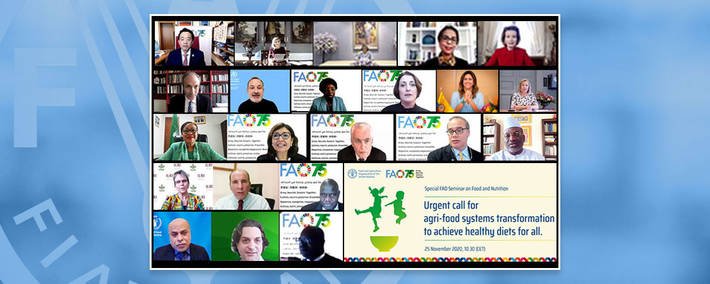Inside BENEO’s new pulse plant: pioneering sustainable protein from faba beans
The discussion took place at a Special Seminar on Food and Nutrition, organised by FAO, entitled Urgent call for agri-food systems transformation to achieve healthy diets for all
Global leaders called for an urgent action to transform agri-food systems to make them more sustainable and resilient in the face of Covid-19 pandemic and other crises, and ensure that everyone has access to affordable, healthy and nutritious food. The discussion took place on 25 November at a Special Seminar on Food and Nutrition, organised by FAO, entitled Urgent call for agri-food systems transformation to achieve healthy diets for all.
The keynote speakers included FAO Director-General QU Dongyu, Her Majesty Queen Máxima of the Netherlands and United Nations Secretary-General’s Special Advocate for Inclusive Finance for Development; Her Majesty the Queen of the Belgians and SDG Advocate; Her Royal Highness Princess Maha Chakri Sirindhorn of Thailand; Josefa Leonel Correia Sacko, African Union (AU) Commissioner; Cecilia Morel, First Lady of Chile; and Maria Juliana Ruiz, First Lady of Colombia.
In his opening remarks, FAO Director-General QU Dongyu highlighted that solidarity, urgency and action were three crucial elements needed to achieve progress in transforming agri-food systems towards healthier diets. FAO estimates that more than 1.5 billion people cannot afford a healthy diet that meets the required levels of essential nutrients and 3 billion people cannot even afford the cheapest healthy diet.
The Director-General stressed that actions should be taken not only towards improving production, but also creating conditions for people to consume healthy foods, which requires integrated actions by all stakeholders at local, national, regional, and global levels, and across multiple fronts – not only in agriculture, but also in many other sectors such as trade, health, environment, education and infrastructure.
He singled out three critical drivers:
(i) Supporting countries, especially the least developed ones, to strengthen their resilience, first and foremost through increased investment;
(ii) Shifting agricultural policies towards sustainable production of more healthy foods, such as fruits, vegetables and fish, as well as aquaculture products, rather than high quantities of staple foods like rice, wheat, and maize;
(iii) Implementing innovations and digital technologies in agri-food systems to increase agricultural productivity sustainably and integrate smallholders into markets.
QU also highlighted the importance of food loss and waste reduction as the key element “that will allow us to improve food security and nutrition, improve the use of natural resources, and reduce environmental pressures”.

